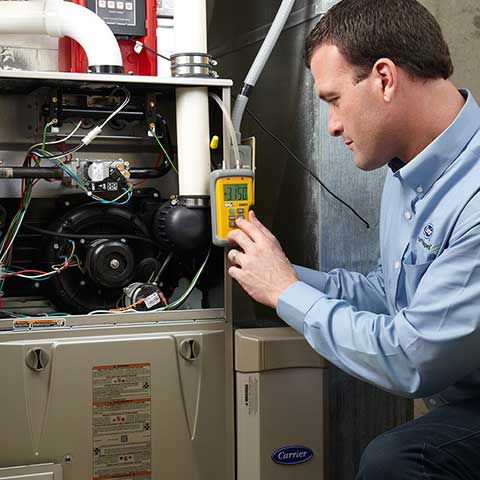 Your home’s furnace is crucial to your comfort, especially during the cold winter. However, like any mechanical system, furnaces have a limited lifespan and can encounter problems over time. When your furnace is acting up, you’re faced with a decision: Should you repair or replace it? This choice can have significant financial implications, affect your comfort, and even impact your home’s energy efficiency. In this article, we’ll explore the factors to consider when deciding: furnace repair vs replacement.
Your home’s furnace is crucial to your comfort, especially during the cold winter. However, like any mechanical system, furnaces have a limited lifespan and can encounter problems over time. When your furnace is acting up, you’re faced with a decision: Should you repair or replace it? This choice can have significant financial implications, affect your comfort, and even impact your home’s energy efficiency. In this article, we’ll explore the factors to consider when deciding: furnace repair vs replacement.
The Age of Your Furnace
One of the primary factors in this decision is the age of your furnace. Furnaces typically last between 15 to 20 years. If your furnace is still relatively young and has yet to experience frequent breakdowns, repairing it is often more cost-effective. However, if your furnace is nearing the end of its expected lifespan and has required multiple repairs in recent years, replacement may be a more sensible long-term investment.
Repair Costs vs. Replacement Costs
When your furnace is malfunctioning, it’s essential to obtain repair quotes from reputable HVAC professionals. Compare these repair estimates to the cost of a new furnace. If the repair costs are relatively minor, like a faulty thermostat or a broken fan motor, it may make sense to opt for repairs. However, if the repair costs are substantial, such as replacing the heat exchanger or the entire burner assembly, investing in a new, energy-efficient furnace might be a wiser choice. Older furnaces have less energy efficiency than more recent models, so you could save on energy bills by upgrading.
Energy Efficiency
As energy costs continue to rise, homeowners are increasingly concerned about energy efficiency. Modern furnaces are designed to be more energy-efficient than older models. Replacing your furnace with a high-efficiency model can lead to significant energy savings if it is over a decade old. Look for furnaces with high Annual Fuel Utilization Efficiency (AFUE) ratings, indicating how efficiently a furnace converts fuel into heat. Newer models can have AFUE ratings of 90% or higher, while older ones might be closer to 70%. Over time, this difference can translate into substantial savings on your heating bills.
Consistency and Comfort
An older furnace can need help to maintain a consistent and comfortable temperature in your home. You might notice uneven heating, cold spots, or fluctuations in temperature. These issues can lead to discomfort and frustration. If your furnace cannot keep your home consistently warm, even after repairs, it may be time for a replacement. Newer furnaces have advanced technology and features that ensure more even and consistent heating throughout your home.
Environmental Considerations
If you’re environmentally conscious, replacing your old furnace with a newer, more energy-efficient model can positively impact you. High-efficiency furnaces produce fewer greenhouse gas emissions, helping reduce your carbon footprint. Additionally, some states and municipalities offer incentives and rebates for homeowners who upgrade to energy-efficient heating systems, making replacement a more attractive option.
System Compatibility
Consider your existing HVAC system when deciding between repair and replacement. If your furnace is compatible with other components of your HVAC system, such as the air conditioner and thermostat, and they are in good working condition, repair might be a more straightforward solution. However, replacing the entire system might be more efficient and cost-effective in the long run if your furnace needs to be updated and compatible with other components.
Long-Term Planning
Think about your long-term plans for your home. If you intend to stay in your current residence for many years, investing in a new, energy-efficient furnace can be a wise choice, as it will pay off lower energy bills and improve comfort over time. On the other hand, if you plan to sell your home in the near future, repairing the existing furnace may be sufficient to make your home marketable, provided it’s in good working condition.
Conclusion
Deciding between furnace repair vs replacement can be complicated. It involves considering factors like the age of your furnace, repair costs, energy efficiency, comfort, and long-term plans for your home. To make an informed decision, it’s advisable to consult with a qualified HVAC professional who can assess your furnace’s condition and provide recommendations tailored to your specific situation. Ultimately, the choice between repair and replacement should prioritize your comfort, energy efficiency, and financial well-being in the short and long term.

